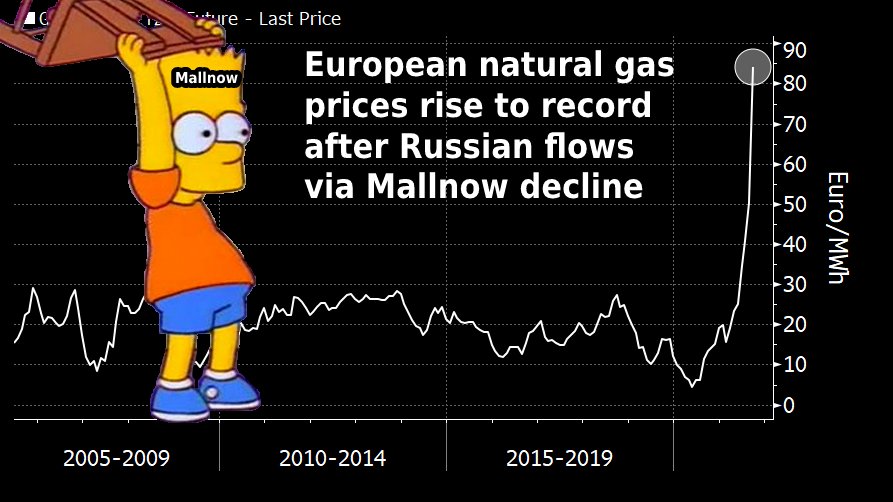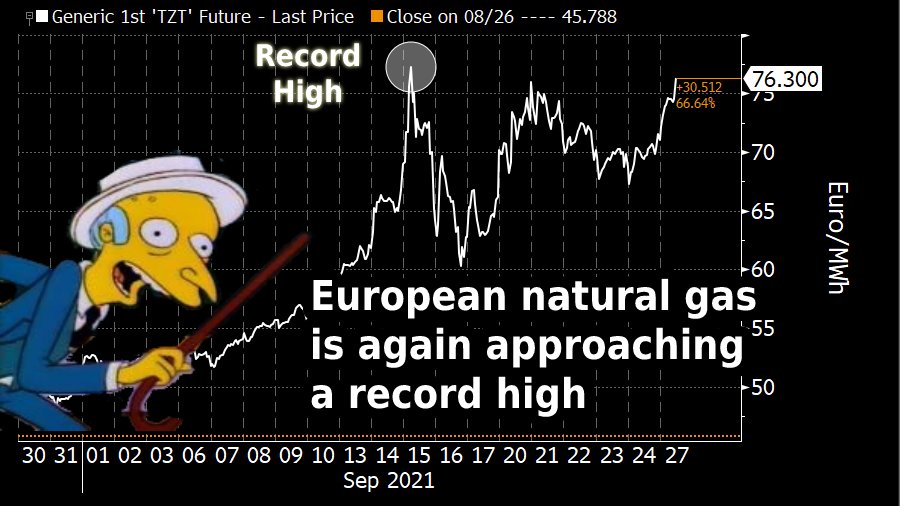
This winter, the world will be fighting over a finite supply of natural gas 🥊
The energy crisis in Europe presages trouble for the rest of the planet as the continent’s gas shortage has governments warning of blackouts and factories being forced to shut
bloomberg.com/news/articles/…
The energy crisis in Europe presages trouble for the rest of the planet as the continent’s gas shortage has governments warning of blackouts and factories being forced to shut
bloomberg.com/news/articles/…
🇨🇳 China, the world’s top buyer of natural gas, hasn’t filled stockpiles fast enough, even though imports have surged in the last year
Several Chinese provinces are already rationing power, and gas shortages and frigid weather could exacerbate shutdowns
bloomberg.com/news/articles/…
Several Chinese provinces are already rationing power, and gas shortages and frigid weather could exacerbate shutdowns
bloomberg.com/news/articles/…
🇰🇷 While South Korea is largely protected by long-term LNG contracts that are indexed to oil, Korea Electric Power Co. said on Sept. 23 that it will increase electricity prices for the first time in almost eight years
en.yna.co.kr/view/AEN202109…
en.yna.co.kr/view/AEN202109…
🇵🇰 The cost of securing LNG supplies has sparked a political controversy in strapped Pakistan, with opposition politicians demanding an inquiry into purchases by the state-owned importer
dawn.com/news/1638037
dawn.com/news/1638037
🇧🇷 In Brazil, a drought has curbed hydropower output and forced utilities to rely more heavily on gas. The country boosted gas imports to an all-time high in July, and power bills are rising 

🇪🇺🇬🇧 And then there is Europe
Power prices across the continent has surged due largely to the record-breaking rally in gas prices
Utilities are struggling to refill seasonally low inventories amid limited flows from Norway/Russia. Meanwhile, Asia/Brazil are buying all the LNG
Power prices across the continent has surged due largely to the record-breaking rally in gas prices
Utilities are struggling to refill seasonally low inventories amid limited flows from Norway/Russia. Meanwhile, Asia/Brazil are buying all the LNG

🥊The stage is set for an all-out scramble among Asia, Europe, the MidEast, and S. America for LNG
“We have huge demand from all our customers and unfortunately, we can’t cater for everyone,” Qatar’s energy minister warned last week
bloomberg.com/news/articles/…
“We have huge demand from all our customers and unfortunately, we can’t cater for everyone,” Qatar’s energy minister warned last week
bloomberg.com/news/articles/…
🇪🇺💥🇨🇳
Already, you're seeing a bit of an LNG bidding war between Europe and China
Sinopec just bought a bunch of winter LNG cargoes at wide premiums to the European benchmark, indicating that China is willing to fork over more cash for the fuel as its energy crisis deepens
Already, you're seeing a bit of an LNG bidding war between Europe and China
Sinopec just bought a bunch of winter LNG cargoes at wide premiums to the European benchmark, indicating that China is willing to fork over more cash for the fuel as its energy crisis deepens
🇺🇸 The situation in the US is interesting
American LNG exports are poised to hit a record high this winter due to the robust overseas demand
That leaves less gas for the domestic market, which means Henry Hub could extend its rally. Prices are already trading near a 7-year high
American LNG exports are poised to hit a record high this winter due to the robust overseas demand
That leaves less gas for the domestic market, which means Henry Hub could extend its rally. Prices are already trading near a 7-year high

• • •
Missing some Tweet in this thread? You can try to
force a refresh













